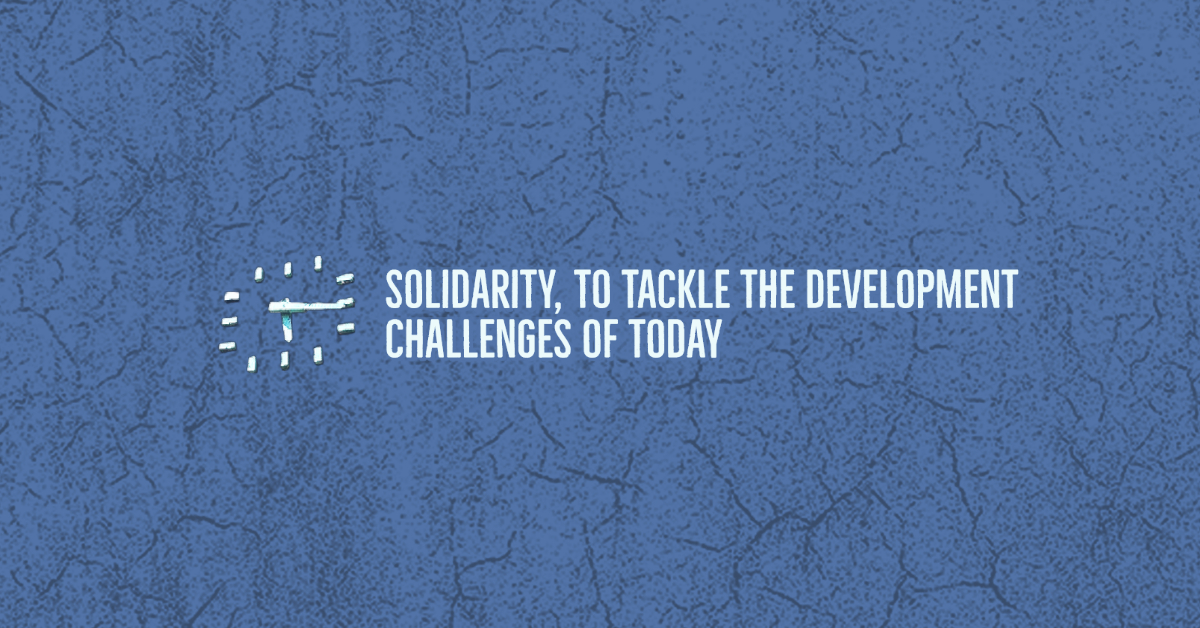Solidarity, to tackle the development challenges of today
May 4, 2023

International cooperation, be it between countries, organizations, social movements, or individuals is one of our best paths forward in tackling development challenges. It always has been. The history of International Relations is filled with cases where parties have either recognized their mutual interest to collaborate in the achievement of common goals or have decided that it is the right thing to do and mobilized action around it. Ratified international treaties, the creation of international organizations, the establishment of formal and informal global structures to help accelerate the achievement of common goals is not an exception in global politics, it is the norm. Notably, this March, we saw the power of multilateral/international cooperation, when delegates reached an agreement on protecting marine biodiversity in international waters, in what has been labeled as a ‘victory for multilateralism and for global efforts to counter the destructive trends facing ocean health’. Albeit some of these victories can be long in the making (this treaty took more than a decade of negotiations to ensure an agreement on how we can protect the oceans that lie outside national boundaries), but its existence and future implementation will be an engine for progress. We can also use the example of the Sustainable Development Goals (SDGs). Embedded within them is Goal17: Partnership for the Goals, that recognizes the importance of having a revitalized global partnership in order to reach the sustainable development of our common aspirations. This SDG Goal echoes the need for us to be supportive, empathetic, inventive, and cooperative if we want to build a better world. Not just states amongst themselves, but a range of actors in the world of politics.
The challenges of today, and what lies ahead, will undoubtedly have international cooperation as a part of the response. However, often, we will also have to rely on solidarity in our response to global challenges. Take for instance the climate crisis that we are facing. International cooperation to tackle the challenge is a must, but cooperation that is underpinned in solidarity. We are quickly learning that solidarity plays a vital role in tackling this challenge. To illustrate, UN Secretary General at COP27 called for ‘a historic pact between developed and developing countries’, framing the climate change emergency as a moral imperative, and a fundamental question of international solidarity and climate justice. Recently, he proposed to G20 a Climate Solidarity Pact, and an acceleration agenda to reach the goals of the Paris agreement. We need this type of inter-country solidarity, so that we can tackle this issue holistically, and mindful of the unequal contributions that caused the problem, and the unfair distribution of its consequences. Adjacent to these calls, we also see young people calling for ‘an intergenerational solidarity’ on the climate crisis, mindful of the disproportionate burden of the impact of climate change on different generations. Demanding greater solidarity is also in the focus of the 2022 special report on ‘New threats to human security in the Anthropocene’, that argues in favor of complementing the current strategies and protections with solidarity so that we can stand up to the challenges of the Anthropocene.
Clearly solidarity plays and is yet to play an integral role in our response to climate change, but it seems that advocating for greater solidarity has been a core ask during other key global processes, including the covid pandemic, the polycrisis that followed it, human rights movement, as well in responding to disasters and humanitarian crisis, to name a few. Lastly, we witnessed renewed calls for international solidarity, as one of the worst disasters this century unfolded in February 2023 in Türkiye-Syria, impacting millions of people and leaving the countries in disarray. On the topic of solidarity in the aftermath of crisis, this year, we are commemorating the 60th year of the 1963 Skopje earthquake that left the city in rubble. North Macedonia, at the time received immense support and solidarity from the UN system, countries and people towards rebuilding and reconstructing the city and lifting the spirts of people. To show gratitude for this endeavor the city adopted the motto ‘Skopje, the city of international solidarity’, recognizing the role other countries and individuals played in rebuilding the city. Even today, symbols of the manifested solidarity can be found on the streets of the capital, be it the streets named after contributing countries, or the objects and neighborhoods that were built in the post-earthquake period.
This 60th memorial of the Skopje earthquake seems to be an opportune moment for a broader conversation on the importance of solidarity in development. Therefore, the UNDP country office is pursuing three core activities. We have invited scholars, practitioners, activists, students, and young people to offer their thoughts and arguments on the importance of solidarity in various development themes. We are working together with one of the leading think tanks in the country on publishing a national compendium containing these articles, all thematically adjacent to the topic of solidarity. Moreover, in the month of May we are hosting an international conference and a community of practice on the topic of ‘Urban Resilience’ and ‘Disaster Risk Reduction and Crisis Preparedness and Response trainings. Finally, as UNDP we are coordinating an informal group of institutions, organizations and enthusiasts in North Macedonia that all have events and processes around the Skopje earthquake and the topic of solidarity.
We believe all these processes will either kick-start or contribute to an existing conversation about the role solidarity plays in our communities, and we hope to inspire a conversation here in North Macedonia about the future of development through these lenses.

 Locations
Locations